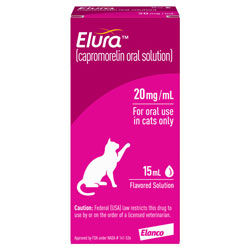Elura (capromorelin oral solution)
+ Save on each recurring order!
- FDA approved for the management of weight loss in cats with chronic kidney disease.
- Ghrelin receptor agonist that mimics the action of the naturally-occurring hormone, ghrelin
- Oral liquid solution, administered at a dose of 2mg/kg body weight, once daily
- Available in one size – 15mL bottle with a 1mL syringe included
Description
Elura is indicated for the management of weight loss in cats with chronic kidney disease.Dosage and Administration
2mg/ml (0.9 mg/lb) administered once daily.To administer ELURA:
- Remove the cap, insert the dosing syringe, invert the bottle, withdraw the appropriate amount of solution.
- Return the bottle to the upright position, remove syringe, replace the cap.
- Administer the solution into the cat's mouth.
- Rinse the syringe and plunger with water and leave apart to dry.
If the cat is routinely fed meals, offer food 30 minutes after administering the dose. If the cat vomits within 15 minutes or only receives a partial dose, then the dose may be re-administered.
Active Ingredient
Capromorelin 20mg/ml
Important Safety Information
For oral use in cats only. Do not use in cats that have a hypersensitivity to capromorelin, or in cats with hypersomatotropism (acromegaly). ELURA may increase serum glucose for several hours after dosing; use in cats with current or historical diabetes mellitus has not been evaluated and may not be appropriate. Use with caution in cats that may have cardiac disease, severe dehydration, or hepatic dysfunction. ELURA has not been evaluated in cats younger than 5 months of age, or in breeding, pregnant or lactating cats. The most common adverse reactions included vomiting, hypersalivation, inappetence, behavior change and lethargy.







